|
Taken from Rolling Stone (Jul 14, 2021)
'Welcome 2 America': The Oral History of Prince's Lost Album
A previously unreleased 2010 Prince record arrives this month. His collaborators look back on the sessions and offer a glimpse into the icon's private world
by David Browne
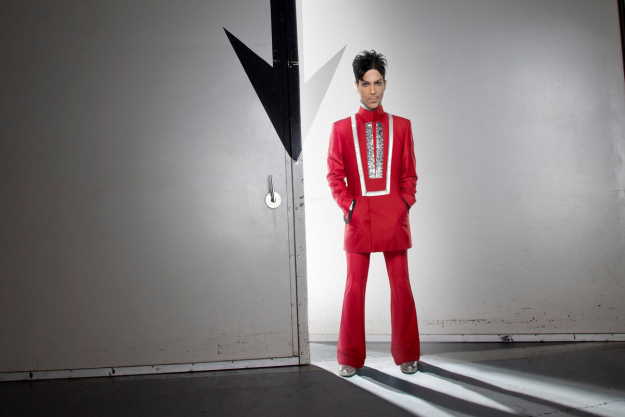
Collaborators on Prince's 2010 album 'Welcome 2 America,' which will finally be released this month, look back on the LP that almost never was. Copyright: Mike Ruiz/The Prince Estate |
On and off since Prince's death in 2016, archivist Michael Howe has spent ample time sifting through audio and video tapes, film footage, and other sonic flotsam in the late pop star's vault. But last year, in the L.A.-area storage space that currently houses Prince's archives, Howe came across three CD-Rs, each with a title and track sequence written on its cover in Prince's own hand. He quickly realized he'd stumbled upon something he'd only heard whispers about: a complete, unreleased Prince album.
Recorded in 2010 at Paisley Park and featuring songs that venture into political commentary and funky pop, and even a Soul Asylum cover, the record was shelved soon after its completion. It was so under the radar that, according to Howe, even Prince collectors and tape traders were barely aware it existed. "I wanted to see if it did exist," says Howe, who'd heard about the sessions and had been digging around for any sign of them. "And when I came across [the discs], I saw it was an entity in and of itself. These sorts of things are mind-blowingly awesome. It is sight unseen and unheard."
Later this month, that album, Welcome 2 America, finally arrives, 11 years after its completion. In and of itself, it's historic: the first full project unearthed in the vault, as opposed to the outtakes and alternate versions of songs that have appeared on expanded versions of classic albums like Purple Rain, 1999, and Sign o' the Times. "I definitely think it was meant to be this body of work," says Morris Hayes, a recurring member of Prince's New Power Generation who played keyboards on most of the tracks. "It's not a bunch of vault cuts he was just messing with."
Given that it was uncovered around the time of George Floyd's death and the Black Lives Matters protests last year, the timing of its discovery proved auspicious, since the album's songs tackle racism ("Running Game [Son of a Slave Master]"), cultural and religious divisions ("Same Page, Different Book"), and the overtaking of technology (the title song). Some tracks, like "Hot Summer," are among the most accessible songs he wrote in that era. Discussions about releasing the album began almost immediately, although Covid-related delays in production and pressing wound up stalling the project until this year. In this history of Welcome 2 America, participants talk about the recording and completion of the album Prince made and shelved - and the mystery of why it never surfaced until now.
Paisley Park, 2010
After years of combating the music business, Prince was largely his own man by the second decade of the new millennium. He had begun releasing music on his own label, NPG, and regularly disregarded touring-business rules by setting up multiple gigs at arenas on a moment's notice. His business operation was also leaner, as was his home base of Paisley Park in Chanhassen, Minnesota.
Morris Hayes (on-and-off keyboardist 1992-2012, co-producer of Welcome 2 America): I worked there in 1988 as a production assistant. I remember Kim Basinger running around in a summer dress, after Batman. He was a superstar at Paisley. He had a detail. You didn't talk to him directly. If he had a hole in his pants, you wouldn't tell him; you'd tell his assistant. It was like Star Trek - there's a lot of people walking around the building, but you didn't know what they did.
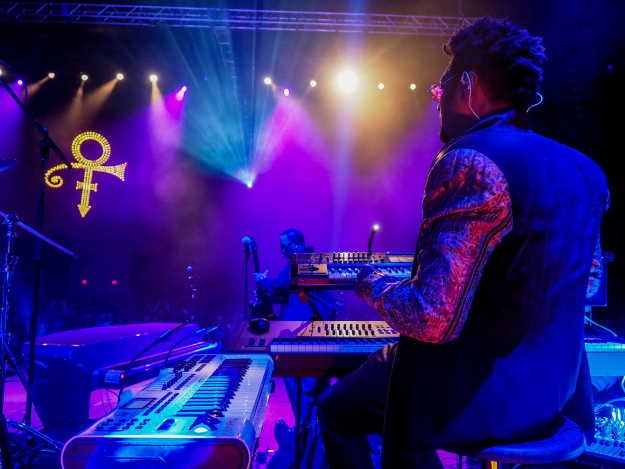
Morris Hayes. Steve Parke/Paisley Park Studios/Getty Images |
But toward the end, he shed a lot of people. It was a more human Prince. He liked hanging with the band. He got over the whole superstar thing and just chilled out. I noticed that was a big difference in him from when I started. Now we were all sitting around eating dinner. That wasn't the case early on.
Elisa Fiorillo (backup singer, 1990-92 and 2009-16): When I was there back in the Nineties, he had an assistant working upstairs. He had a wardrobe person and a publicist upstairs. He had people around all the time. When I went back as his background singer [in 2009], totally different vibe. It was empty. It was just the band and him. It felt more like his house, and we were his family in the house.
Jason Agel (recording engineer, Welcome 2 America): This was my first time at Paisley Park, and it was beautiful. Part of it is a museum now, but part of it was like a museum then as well. The Purple Rain motorcycle was out. He had awards everywhere. Cool-looking guitars in glass cases. A cage of doves.
Shelby Johnson (a.k.a. Shelby J., backup singer 2006-2016): There weren't a lot of people around. Sometimes I would go there to record and Prince would be letting me in the front door.
A New Team
Befitting a fresh start of sorts, Prince turned to musicians and at least one technician he'd never worked with before for his next project.
Tal Wilkenfeld (bassist, 2009-2010): The first time I met him, he and his band were playing at a party. It was a full performance of cover songs in the basement of his house in L.A. There were times when he asked me to come by, and he'd hired a limo, and I was like, "Where are we going?" He's like, "I don't know. I just thought we'd drive around." He'd play me a bunch of music and say, "What do you think of this and what do you think of this person?" Like he was always trying to get feedback and grow in different ways and constantly explore music.
This went on for about a year. He saw me doing Billy Cobham's "Stratus" with Jeff Beck on YouTube, and it was one of the first songs Prince and I jammed on together. The very first time he called me, the first thing he said wasn't "Hey, how are you?" It was, "Do you like the drum rolls of Jack DeJohnette?"
Then he called me at the end of 2009 and said, "I really want to make a trio with you. Can you find me a drummer? I trust your judgment. Why don't you try some people out and tell me who you like?" As we were talking, he told me how much he loved Jimi Hendrix, so I think he started thinking in that direction of trio music. I called some drummers I thought might be appropriate. Chris Coleman was one of them. Prince didn't even try Chris out. He literally just flew us out to Minneapolis days later to start working with him.
Chris Coleman (drummer, 2010): Tal texted me and said, "I've got this opportunity to play with this artist and want to know if you're down." She said she couldn't tell me but finally did, and I did not see that coming. I thought, "This is huge." I was the drummer on the New Kids on the Block reunion tour, and we had just finished a crazy year. I had to cancel on some Joey McIntyre solo shows. At first the music director was upset, but then he totally understood.
Agel: This was the first time I worked with Prince. I got a very unexpected phone call [from Prince's office] to see if I could work with an unnamed star who happened to live in Minneapolis. My first guess was Prince, because I couldn't think of anyone else. And I was right.
But there were a lot of weird, cryptic messages over the next few days, and they finally revealed it was Prince. I would get a call from his assistant saying, "He's going to call you in half an hour," and then it would never happen. Finally, they were like, "Can you just get on a plane and come out here?" They told me I'd be out there maybe three days and then I'd go home.
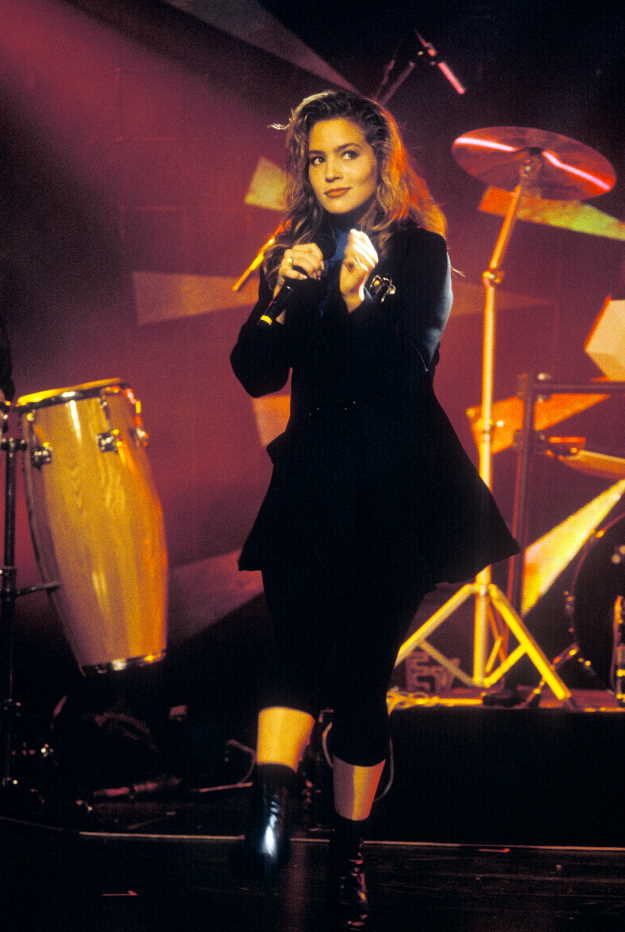
Elisa Fiorillo. Bruno Torricelli/RDB/ullstein bild/Getty Images |
Fiorillo: My record company had dropped the ball big time on my [1987 solo] record. Prince tried to get me to sign - I thought to Warner Brothers - but when I went in to meet with Benny Medina [then an exec at Warners], he said, "Prince wants you to sign to Paisley Park." And I said no. I didn't see a good track record with Paisley at the time, and we kind of parted ways at that point because I said no.
Then 20 years later, I had done a gig in Vegas, and the guy I was working with knew someone who had just finished reworking the studio at Paisley Park, and I said, "Tell Prince I said hi." A couple of days later, I got a call and it was Prince. He's like, "I'm working on a project. I want to include you. I'll be in touch." A couple of months went by and I didn't hear from him and I thought somebody was pranking me, so I called back the assistant and said, "Could you have Prince call me again?" Right away, he did: "Don't worry. I'll call you. You're going to be fine."
A few weeks later I went to California to work with [singer and Prince's then-girlfriend] Bria Valente on her album with him. After not seeing him for 20 years, he looked the same. He had a bit of crow's feet, but that was it. The band and I did Jay Leno, and after the show, he pulled me aside: "You want to be in the NPG?" And I said, "Well, I know I said no to you 20 years ago to be in your band. I have a three-year-old. I've never toured with a child before." He's like, "Don't worry, we'll make it work. We'll do residencies and you can bring her with you." So I said yes.
Coleman: I knew Sheila E. before I went out [to Paisley Park] and she gave me some helpful pointers. She said, "I'm going to tell you this - he'll call you at 10 at night and say, 'You want to come to the studio and jam?'" I said, "OK, cool." She said, "Wait, let me finish. Once you do that, 10 will be the start of rehearsal time from then on. He may even call you at three in the morning. But if you want a life, say no." It wasn't derogatory, just part of their brother-sister love.
Agel: One morning, they call the hotel where I was staying, which is, like, next to a Target parking lot in suburban Minnesota. They said someone would come get me. I wait out front of the hotel, and here comes this Cadillac sports car with an emblem on the hubcaps. It pulls up, blasting funk music, and then Prince steps out of the car. He's wearing a jacket with patches of mirrors all over it. He's fully done up as if he's going to the VMAs. It was pretty amazing, like a complete Prince stereotype in front of me in real life.
We drove around for a while. He was like a Minnesota tour guide, telling me what summer was like and how beautiful it would be in October. We stopped at Caribou Coffee, which is their Starbucks, and the person behind the counter was very nervous, like, "Oh, my God, Prince is here." We got our coffee and then went to the studio.
Recording the Music
Work on the unnamed album began almost immediately. In March, Prince, Wilkenfeld, and Coleman cut basic tracks, with Prince mostly playing guitar, sometimes a keyboard. During the summer, Johnson, Fiorillo, and Liv Warfield added their vocal parts. Hayes overdubbed keyboards, and Agel began helping Prince assemble and mix the completed tracks.
Coleman: On my first day I went to Paisley Park, and Prince's assistant Rick says, "Come with me," and we went into this soundstage so I could check out the drums. I said, "What else do you have? Can I see some options?" He leaves and comes back in five minutes and says, "Let's take a ride." I thought, "Oh, I'm fired already." Instead we pull up to the Guitar Center and walk into the drum department. Rick says, "P says get whatever you want." I said, "Huh? Wait, I'm sorry, Rick. I need you to clarify that. What does 'whatever I want' mean?" [Laughs.] I had to walk into the cymbal room and collect myself. I couldn't believe I had an open check. I picked out an almost $8,000 drum set.
We went back to Paisley Park, and I'm setting up the drums and reaching down to tweak the pedals. When I put my head back up, Prince was standing there in front of me. He said, "How was your flight?" I said, "Smooth. Thank you for the invite." He said, "Glad you could make it." He looked at the drum kit and said, "I was wondering what color you were going to choose." It was a silver-sparkle color. As he's talking, his assistant comes over and drapes a bass around Prince. He never said, "Do you want to play something or do you know this song?" He just starts playing "777-9311" by the Time, the ultimate drum song. I knew it but not absolutely perfect. I played it about 97 percent correct. This was all in my first day.
Wilkenfeld: Things moved really quickly. We did a few days of jamming in the main rehearsal area. The next time we showed up, we were recording an album. Prince wasn't singing when we were tracking. He wouldn't even tell us the structure of the song or what was coming next. All he would say was, "OK, I'm going to go from this chord to that chord, and then I might go with this chord, but I'll look at you and you'll know." We didn't have any idea what the song was about or anything. He would just count it off and, "Roll tape!" He would just speak on the mic like, "More snare."

Tal Wilkenfeld. Martial Trezzini/Keystone/AP |
We cut this whole record in a matter of days. It was the exact opposite to how 95 percent of records are made these days, where you work on something for sometimes months and you're tweaking and rerecording. We just had to use our intuition based on how he was performing the song on the guitar and the chords.
Agel: He wanted to try new things with technology, like throwing his guitar through Auto-Tune. But he felt that not a lot of music out there was as organic as it needed to be. He said he wanted it to sound like air moving through speakers.
Coleman: He would literally say, "First verse, second verse, chorus, bridge" while we were recording. You had no time to practice. Every once in a while, he'd stop and say, "Hmm, try this instead."
Fiorillo: We were rehearsing for a tour of Europe. Our rehearsals would start about noon. He would sleep until one or two and would kind of mosey in around two. We would rehearse eight hours every day, seven days a week. Then he'd say, "Let's go to the studio. I have something I want you to sing on." I didn't even know we were making a record.
Liv Warfield (backup singer, 2009-2016): We never knew which songs we'd be working on each day. He was just coming in and bringing these lyric sheets, like a machine. It just poured out of him, and you could feel that it was just like a freight train.
Hayes: One day he called me and said, "Can you roll by Paisley real quick? I want to play you something." So I hop in my car and go over. There's a back entry to the garage, and he was already sitting there in the back parking lot in what I used to call the Batmobile - a Cadillac convertible hard-top two-seater. I pull up next to him and he tells me to hop in. He's got a nice sound system in there, and he played me through every track. Only one or two he played the whole song. It was just us in the parking lot with the squirrels.
He'd already done vocals and had background vocals and skeleton tracks. I thought, "This is a little happy departure and interesting kind of vibe." On "Born to Die," he was telling me he was watching Dr. Cornel West. They're really good friends, but he said, "I was watching YouTube, and Dr. West was saying, 'Brother Prince is great, but he's no Curtis Mayfield.'" He was like, "Oh, really?" like Dr. West had issued him a challenge: "I have to show Dr. West what time it is."
And after we gone through this, he gave me the CD with his little handwriting on it - I still have it somewhere - and I just ripped everything off the CD [to add his parts]. He was like, "You take it and go with it." For "Born to Die," I made this crazy patch on my keyboards to get that Seventies flavor.
The Songs
As the singers and players learned, the songs ran the gamut from playful to serious, from funk to pop.
Warfield: We'd be looking at the lyric sheets, Elisa and I, and saying, "Man, where is his head?" It was some serious stuff he's talking about. "Running Game (Son of a Slave Master)," I would have liked to know what sparked that. Clearly there was something going on in his head.
Hayes: "Same Page, Different Book" is about how everybody's got their different views about religion and philosophy, but really, at the end of the day, we're all on the same page; but it's just a bunch of different books. There's a lot that we do have in common.
Fiorillo: "Welcome 2 America" is just a take on how he felt the world was and how much was wrong with it and how we could fix it and how we could hopefully change it in the future.
Hayes: I remember him talking about "Welcome 2 America." He spread some stuff in that track, talking about the iPhone and the iPad - really breaking it down about how government and people are watching you, and all your devices that are permeating society.
That's why he never had a phone. He didn't carry a wallet. He just shirked all that stuff, man. He would use my phone or someone else's. He would say, "I'll use your phone, Morris." He would memorize numbers and tell me what number to call. Who does that? I don't even know my dad's phone number because it's programed into my phone.
So that's the crutch we created. And I think he wanted to bring attention to how much we depend on these things so much that they run us. He already knew where it was going. You can't separate people from their cellphones and all that crap, and he knew he was going to hit a nerve. He was saying, "This is gonna grab 'em right here."
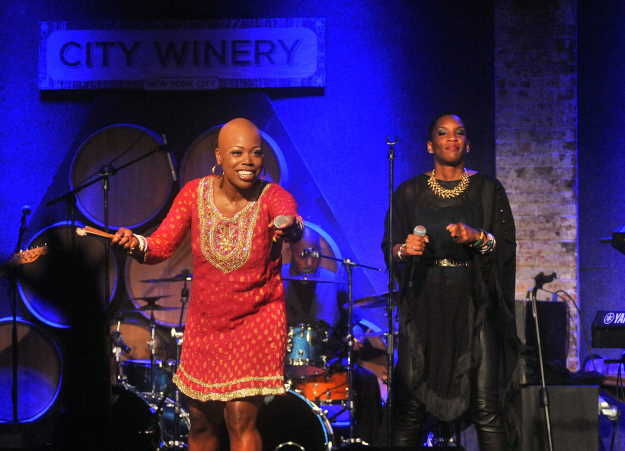
Shelby J (left) and Liv Warfield. Henry S. Dziekan III/Getty Images |
Fiorillo: He wanted to feature us, so he had us sing a cover of Soul Asylum's "Stand Up and Be Strong" [which Prince retitled "Stand Up and B Strong"]. Don't think he was done with that one; it doesn't sound finished to me. He definitely would have come back and added something to it because to me it's a little empty, production-wise.
Hayes: I didn't do anything on that song, but it's interesting because Prince was very staunchly against anybody doing his music! [Laughs.] It was crazy, man. People like Snoop Dogg would call about wanting to use a Time track. And I'd say, "Snoop, man, he's not going to go for it." Snoop didn't need his permission but he wanted to show respect. But then Prince would do these covers. I got into a big argument with him about it. I said, "Prince, you say you don't want anybody to do your stuff, but we're doing four covers on this album [Emancipation]. It's kind of hypocritical, bro." We used to do a lot of covers at the after-show gigs, and it just started creeping into the albums.
Fiorillo: I remember "Hot Summer," this kind of weird Eighties dance song. It was summer when we did it. We got in the car and drove downtown to Minneapolis in his car with the windows rolled down. We were listening on full blast with our heads bobbing at the same time. There were people on the street, and we're saying to Prince, "Oh, my God, they're going to know it's you." And some people could see and pointed as we drove right fast, like, "I think that was Prince!"
Hayes: Prince would always talk to me about keys. He'd say, "There's too much music in minor keys. There should be a lot more songs in major keys." And "Hot Summer" is a major-key song. It was definitely a tip of the hat to Sly and the Family Stone. We all loved "Hot Fun in the Summertime." He wanted to add a guitar to "Check the Record," but he never did. [Imitates part of the song where Prince sings a guitar solo.] That was going to be his guitar, a harmonic kind of thing. He was doing a dummy track of what he was going to do. It just got left like that.
Saucy Prince Returns
At least one song on the album, the salacious slow jam "When She Comes," was a return to his Dirty Mind days.
Hayes: That song is so dope. It's a throwback to how cool it was to hear his falsetto over some simple music. I made a joke about it. I said, "This is old Prince. This is gonna get you in the witness protection program at Jehovah's Witnesses. You're going to get in trouble for this!" He just had a little laugh about it.
Johnson: I heard about three-fourths of it and saw the lyrics. There was one point where we were actually in the studio going over the background vocals for it, and then he said, "No, no, no, no, no. I'm going to do this myself."
Fiorillo: We weren't allowed to sing on that one. When he was done, he played a little snippet and then he stopped, and he's like, "That's enough. You can't hear the rest." There was a little bit of sexual innuendo to it. Out of respect for his sisters - which is what he called us - he didn't want us to listen to it.
Prince Will Be Prince
He may have been more relaxed than at other points in his career, but Prince could still be enigmatic and unpredictable - and a taskmaster.
Johnson: We'd be recording in Studio A and then go to the soundstage and rehearse with the touring musicians for a tour. It was like the Olympics of teaching and coaching. I had a notebook as big as two yellow phonebooks with all the lyrics and set lists.
Fiorillo: When we were rehearsing for the tour, he would tell us to take notes and we would always write it down, in spiral-bound notebooks or on iPads. He would come back the next day, and if somebody messed up, he'd say, "Didn't I tell you to write that in your notes?" He always had his notepad.
Warfield: To be in his world, you really had to be able to flow. I had to really learn that. I had to just leave behind any expectation that I thought of what would be typical and what would not.
Agel: I wasn't allowed to have any visible tattoos. They said to wear something nice - no shorts, a nice-shirt kind of thing. So I always had a button-down shirt on.
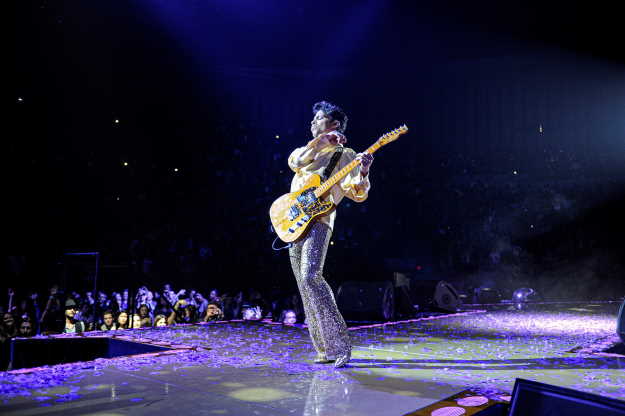
Prince. Copyright: Kevin Mazur/The Prince Estate |
Once, he blocked out a movie theater and took us all to some really shitty horror movie. Then he took me and Shelby to a Vikings game. That was a very intense experience. They ushered us under the [Metrodome] stadium like we were the Beatles or the president. People are freaking out because Prince is there and security is rushing you through. Then it's just the three of us in this suite with all of this food, watching a football game. I got to talk to Prince about football, and I don't think either he or I really understood it. I said, "Are you a big fan?" and he was, "No, actually, I just got into it because Brett Favre came to Minnesota and started playing on our football team. And I saw how much it really uplifted the community. So I wanted to be a part of that." The community in Minneapolis was very important to him.
Johnson: I am a football girl so I was screaming. He'd say, "Watch your voice. We may be recording tomorrow." I'd be like, "Come on!" [Laughs.] Sometimes the cameras would zoom into the room. He would sit in the back area with these little tables and not sit in the front row, so everyone just saw me.
Fiorillo: He was always dressed to the nines until about 2010. Then he was in a very chill mode. We got to see a different side of him then. He wouldn't go out in public without dressing up. But he had us go get him regular yoga pants and Champion sweatshirts.
Coleman: Prince was in a different place in his life. I was expecting a head-trip micromanager and all of these games. But he was different from all the stories. He dressed in what I would call Prince casual. He came down in a solid red suit and tennis shoes or all kinds of custom shoes.
One time we were going to hang out at a club and he said, "Did you bring a suit?" I said, "No, I didn't. I didn't know we were going out." He had Rick take me to a tailor, and next thing I know I'm being fitted for a casual sports jacket and suit without the tie and shirt. Just to look somewhat presentable instead of [wearing] my jogging pants.
Fiorillo: We would work on the album and then we'd all go home. We wouldn't know when we were ever going back to Minneapolis until a day or two before. We seriously thought he had a Bat-Signal. I'd be in a grocery store and suddenly "Raspberry Beret" would come on, and I'd call Liv or Shelby and say, "I just heard a Prince song. I think we're getting the call." And they'd say, "No way, I heard a Prince song today too!" And sure enough, the phone rings and it would be his assistant saying, "We need you on a plane tomorrow."
We never knew when we were going and how long we would be there. You were never supposed to ask, "How much am I getting paid or how long am I going to be gone?" It was like a no-no. Don't ask because there's another musician or singer who would love that gig. It was hard because I had to figure out who would take care of my child and how long they were going to be doing it.
Agel: After 22 days, I was like, "Hey, so, I have a young daughter, and I was wondering when I could maybe go home?" And they said, "You can go home whenever you like and then come back." I was like, "OK, that's good news." I was home for two days and they called and asked me to come back. I was buying socks at that Target.
Hayes: I was in the car with him during this time and he wanted to go to a coffee shop. He wasn't wearing a seat belt. I'm like, "Prince, put your seat belt on, man." He's like, "Nah, it'll just wrinkle my clothes." I said, "Better to have wrinkled-up clothes than a wrinkled-up ass, bro. Put your seat belt on." So he put it on.
The next day, he called and said he wanted to go to a club and check out this band. He said, "You drive," and I'm like, "Cool," because Prince was a terrible driver. I get in the car and I tell him to put his seat belt on. He said, "I'll put it on since you're driving." He made a joke about it, but I said, "Bro, if something were to happen to you, you're a national treasure. The world would be devastated, man. You don't want to get checked out over something as trivial as a seat belt." He put it on.
Agel: One night, he was drinking red wine through a straw, and he drove me back to the hotel. It was snowing out like crazy. He had his girlfriend Bria in the front seat. There's a blizzard, and we're sliding around the highway. He's driving and playing back his rehearsal tapes of the day, which he would record, and he's singing "Purple Rain" to his girlfriend. I'm in the back seat going, "Am I going to die?"
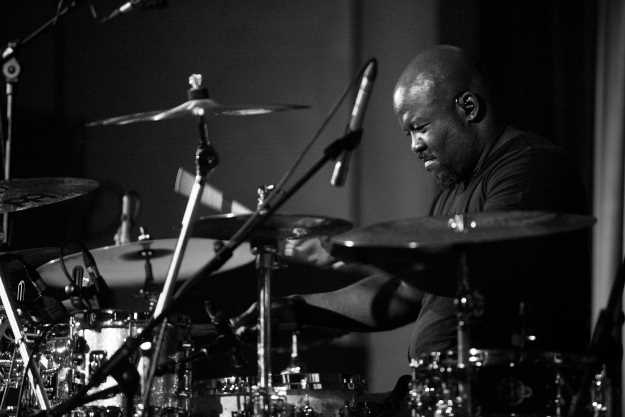
Chris Coleman. Richard Ecclestone/Redferns/Getty Images |
Wrapping Up and Shelving It
By the end of 2010, the album was completed, although its fate was still unknown.
Agel: It was definitely an album he had sequenced and ready to go. It's a body of work that he definitely crafted. The songs are together for a reason. That was obvious.
Wilkenfeld: He was excited and wanted to play us these songs and said, "Let's have a listening party." He would have people in the studio. People were pulling up in limos, really dressed up.
When I was scheduled to fly home, he asked to speak to me. I went into his office and he was sitting at his desk. I don't remember the exact words, but he said, "Thank you so much for bringing this music out of me. I've been trying to get this out of me for years." He was very gracious and sweet. And unfortunately, that was the last time I saw him.
Coleman: On the last day, he said, "I just want to say thanks." I said, "Are we finished?" He said, "I'm feeling confident I got everything down." I said I hoped this wasn't the last time I'd see him. He said, "No, it isn't. We got work to do." Then he said, "Bria's coming in tonight." I said, "I'm not gonna disturb you, brother!" We both laughed. That was the last time I spoke with him.
Hayes: In my 20 years with Prince, I never got any accolades for anything. He was always very careful about doling out compliments. People would get too relaxed. But when this was done, he was hugging me up, like, "Wow, I like it." He was so happy. But then nothing happened with it. I thought it was kind of crazy when we did the Welcome 2 America tour and none of the songs were in the show. I thought, "This is weird. You don't have any of these songs on the tour, but it's named that!"
Warfield: I love "Check the Record" - the bass, everything. I obsess about that tune. I would think, "When are we playing these tunes live?" But we never really played any of them.
Fiorillo: We didn't know what was going to happen to it. We just went in and did what he told us to do and got to listen to the final mix, drove around in his car and listened to it.
I don't think he was unhappy with it. He would get wrapped up in something new and forget he even created something else. And then he would go tour and probably forget about it. He probably was eventually going to get to it and dust off some stuff and remix some of it and maybe add a couple more parts or add more musicians and eventually put it out. I'm pretty sure he would have. But I don't think he was disappointed with it. He was pretty proud of all of the songs, especially "1000 Light Years From Here."
Warfield: I wasn't going to [ask when the album was coming out]. I wanted to make sure I kept my job. I was walking on eggshells at that time. I wasn't supposed to ask questions or anything.
Agel: I had come back to New York and was working with John Legend. I got a call to see if I could come back out to Paisley Park, and I said I couldn't just walk out at that stage. I was also starting to get the picture that a lot of Prince music was probably not going to come out. I was sitting there in a room with John Legend and Kanye West, and Seal was there too. So I told Prince no twice. I'd call his assistant and say, "I can't come out to Minnesota tomorrow because I'm booked. But I can come in a couple of days." Two or three times, they called me to ask me where something was on the hard drive, and I didn't hear from them again. He didn't like to be told no.
Wilkenfeld: With some artists, if they create a specific sound, they like to tour it the same way that they made it. This was a small band putting its own signature sound on the record. I don't know if that had something to do with it. He asked me to go on tour so I could play this music, and I was already booked with Herbie Hancock and Jeff Beck. I was heartbroken that I couldn't do it. That was the toughest moment for me, because I value loyalty.
He was working on, like, four different projects. In the end he decided that he wanted to work on another project or he wasn't ready to put this one out into the world. I can't speak for him. These are just questions that have come up in my mind. I'm curious, just like you're curious.
Hayes: It just kind of went away. I remember some years later I texted him about the project. I told him I would like to settle that out [financially]. He said, "Well, we can talk about it when we put it out." He had been so generous to me that I didn't even trip about it. It was what it was.
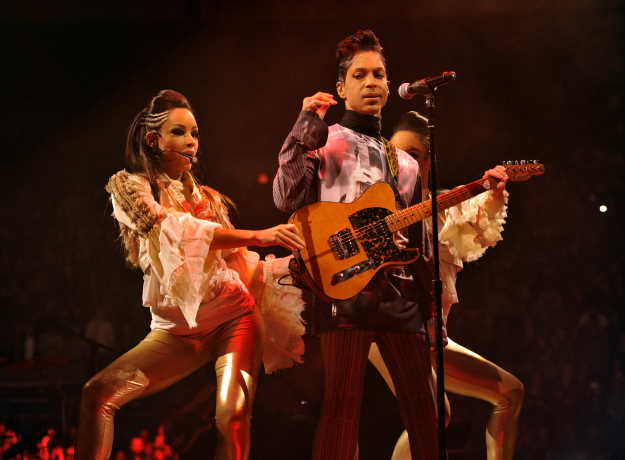
Prince performs during his Welcome 2 America tour. Kevin Mazur/WireImage |
The Album Surfaces
Last year, the various contributors to Welcome 2 America learned that, some 10 years later, the album they'd made with Prince had finally been discovered and was being prepared for a rollout.
Michael Howe (Prince archivist): In the trader community, this was rumored to exist, but it never escaped into the collectors' field. Security measures were more together toward the later portions of his life with respect to unreleased and vault material. It's probably good that it didn't exist on a cassette. It would have been easier to trickle out.
We were thinking about what would be special for the fans, something that wouldn't be as forensic an exercise as a deluxe edition, which requires a lot of heavy lifting and research. We had the nice problem of a finished record. No overdubs or mixing needed. We just had to master the tracks and do the artwork.
Hayes: Last year, the estate reached out and told me they were going to be working on this project. I was shocked and surprised - pleasantly - to hear that. I was like, "Holy smokes, this is crazy. We did that so long ago." But that's the thing I love about music. There's no expiration date. It's not like milk.
Johnson: I had forgotten some of the songs individually, but I hadn't forgotten we had done it. He saved everything.
Warfield: When I was told they were putting it out, I was shocked, because I actually forgot all the songs we recorded. I was like, "What are you talking about?"
Fiorillo: My first reaction was, "Oh, my God, that's right. We did record a ton of songs."
Wilkenfeld: It has that freedom and fluidity and openness that you hear from a trio. I'm surprised at how musical it sounds, considering we weren't hearing the melodies. We did a good job at guessing.
Coleman: I was kind of bummed [when the album never materialized]. I was like, "Damn - I guess it's not coming out." But Sheila told me, "It's gonna come out, trust me." Then Tal called me at the beginning of this year and said, "Guess what? They're going to release the record." I was like a kid in a candy store. Every song is bringing back memories. I've been in that elevator where they found him. I thought, "Man, I miss you, and you left way too soon."
Agel: It takes me back to that totally weird time in my life, this extremely surreal experience. Some of the things, like "1010 (Rin Tin Tin)," I can remember listening to that with him next to me. So it was really crazy to hear it again. I just remember sitting in the studio and him playing a guitar solo next to me. I'm a guitar player, and I grew up listening to the Batman soundtrack in my room as a kid. And here he is, playing ripping guitar. I had to turn my face and try not to laugh because it was just such a surreal thing that was happening.
Fiorillo: The last time I talked to him was after he landed in that plane [in 2016]. I was tweeting him in his inbox. I asked him, "Are you OK?" And he [tweeted back], "Save your prayers. I'm fine. Controversy." And I was like, "What the hell does he mean by that?" And I said, "Well, I'm a mom. I'm worried. Are you eating? Are you sleeping? Please take care of yourself." And then that [his passing] happened. He's the last person I ever thought would have a drug overdose. Guy was clean as a whistle, so it didn't make sense to me, and it still doesn't.
Howe: [On the events of 2020 prompting the release of the album] It certainly accelerated it. Certainly what was happening in Minneapolis especially was adding some serious urgency to get this thing up and out, and contextualize it the right way
Hayes: To me, it further solidifies that this was a vanguard artist looking forward. Look at what we're dealing with after George Floyd and everything that happened, and this record is speaking to stuff that is pertinent now. That's what's crazy about it. It's like he could have made this record right now. This just solidifies that Prince was not like your average bear. He was deserving of the titles that people have heaped on him for years, like "genius." It gives credence to all the things people said.
|